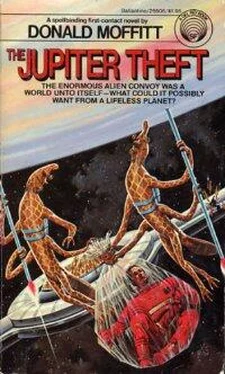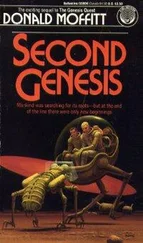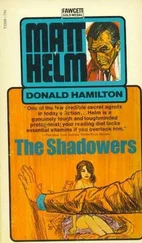“Most of you know Jack Gifford,” Boyle said. “Jack worked right alongside Roy Jenkins as an alternate during the initial training exercises, and SRA’s been keeping him up to date right along. I’m sorry to have to tell you that Roy’s been scrubbed for medical reasons. We’ll all miss him. Jack will take his place as probe tech.”
Gifford smiled and nodded and took his place in the audience, squeezing in next to Sue Jarowski. He immediately struck up a conversation with her, something involving huge gestures. A couple of seats away, Dmitri looked unhappy.
Another man had slipped in through the door behind Boyle. He had a seal’s head, sleek and shiny, and a triangular face with the kind of sallow complexion that always shows a subsurface smear of blue whiskers. The head seemed too small for the massive slope of shoulders and the bunched muscles that stretched the sleeves of his T-shirt. He was wearing a pair of heavy boots with thick gum soles. They struck Jameson as, out of place in space, where the soles of your feet were among your most important sense organs.
“This is Emmet Klein,” Boyle said. “He’ll be replacing Ham Bailey in charge of Stores.” He cleared his throat. “Bailey will be returning Earthside for reassignment. Our new stores exec is fully qualified—he’s had three years at Mars Station and more recently has been working at the shuttle-launch complex at Salt Lake. I’m sure you’ll all get along fine with him.”
Maggie poked Jameson. “What do you think?”
Jameson frowned. “I don’t understand,” he said. “If Bailey had to be reassigned, why didn’t they replace him with Vitali or Michaels—somebody who’s familiar with the mission? Mars and Salt Lake are impressive assignments, but they’re ground-based.”
People were standing up. A small knot of men and women clustered around Klein and Gifford, all talking at once. Klein looked uncomfortable. Jameson felt sorry for him.
“Meeting’s over,” Maggie said, getting up. “Are you going to be at the party tonight?”
“Wouldn’t miss it,” Jameson said. “First I’ve got to go over to China country and talk to Li about closing down the lander and getting it podded.”
Captain Boyle was coming down the aisle, heading for the exit. Jameson stepped out and stopped him.
“What’s all this about reassigning Ham, Skipper?’ he inquired. “He’s the best stores exec we’ve ever had. He’s been checked out for the mission for a year.”
Was Boyle avoiding his eyes? “I don’t know, Commander,” he said brusquely. “I don’t make policy. They do that down at Space Center.”
“Nothing medical, I hope?”
“Bailey’s fine.”
“That’s good to know. I’ll look forward to helping give him a good send-off at the party.”
The captain’s red face seemed to get a shade redder. “He won’t be at the party,” he said. “He’ll be leaving on the next shuttle.” He looked at his watch. “About ten minutes from now.”
Captain Boyle’s party was turning into a noisy success. Most of the crew had made some effort to dress up in Earthside clothes for the occasion, and there was a glitter of bright colors and iridescent fabrics. A couple of the younger dancers of both sexes wore little more than sparklepaint and stickumcups, but Beth Oliver, the beautiful and sought-after chemistry chief, was stunning in a full-length kaleidogown that shifted from endlessly flowering geometric patterns that spilled out of scores of focal points to an eye-boggling infinite-depth effect as she twisted in time to the thrumming slipbeat. The dancers took advantage of the low gravity in the bubble lounge to do complicated midair pirouettes, sometimes joined and sometimes in facing pairs.
The bubble lounge, halfway up one of Eurostation’s main spokes, had a dreamlike quarter-gravity that went with the imaginative decor: space itself. The six enormous lobes of clear Lexan, bunched around the central shaft, brought the universe inside—an illusion that the designers had deliberately fostered by using the barest minimum of silvery, deceptively fragile-looking ribs to support the transparent plastic, and by the hologenerated sparks of light that flickered on and off throughout the interior, like stars passing through. Directly above, you could see the diminishing spoke and the hub of the station, but everywhere else you saw only stars, drifting by like a million Christmas lights.
Jameson, a lidded drink in his hand, was part of the group gathered around the Moog. Mike Berry was at the keyboards, rapping out a creditable slipbeat. He’d dialed in a seventeen-bar ground that the Moog repeated over and over again, with random computer variations of timbre and ornamentation, and there was some kind of raga, also computer generated, weaving in and out of it. He’d punched in three basic beats that slid through one another with hypnotic insistence, and over the whole framework he was improvising a primitive but energetic mélange of chords and runs that contained fragments of some of the more popular recent hits.
“Want to spell me, old chum?” Berry asked Jameson.
“No thanks,” Jameson said. “I’d rather enjoy my drink. I’ll suffer along with you.”
Maggie, leaning over the console, her hand on Berry’s shoulder, looked up and said, “Why don’t you? Mike tells me you’re good.”
Jameson laughed. “I noodle around a little—old music mostly. I’m no good at party stuff. I’d kill the dancing.”
“He’s right,” Berry said. “No sense of rhythm—even with the Moog to help him. He’s better off poking around with Bach and Mozart and Farnaby and all those other ancient foot-tappers he likes.”
“I don’t like committee music,” Jameson said good-naturedly. “At least the Chinese leave out the aleatory computer input.”
“He has a hyper ear for tone, though, I’ll give him that,” Berry went on imperturbably. “Did you know that behind that standard face lurks the gift of absolute pitch?”
“Is that true?” Maggie said.
Berry answered for him. “Of course, absolute pitch has nothing to do with musical talent. It’s just a freak ability.”
“Mike, on the other hand, has talent but a tin ear,” Jameson said. “Haven’t you noticed that the Moog’s out of tune? The last person who used it must have been fooling around with an enharmonic change between F sharp and G flat. I’ve been wincing for the last half-hour. You better clear the instructions and get it back to equal temperament.”
Unabashed, Berry went on playing.
“Can you really tell?” Maggie said.
Jameson’s attention was distracted by the sight of Sue Jarowski drifting over, with the new man, Gifford, in tow like a magnetized particle. Sue was wearing an off-the-bosom chlamys with what seemed to be nothing more than a spray-on on the revealed side. “Sure,” he said absently. “Won a lot of bets with it when I was a cadet—earned my pocket money that way. Used to bet I could tell a fellow what note his boot was squeaking on, or whether somebody had just belched in B flat or B natural.”
“Maggie’s an antiquarian too,” Berry said. “Collects old things.”
“Old physicists, you mean?” Jameson said automatically.
Maggie laughed. “Nothing too really hyper,” she said. “Twentieth-century plastic bottles, mostly.”
“Expensive hobby,” Jameson said.
Sue and Gifford pushed their way through the circle surrounding the Moog. Dmitri was hovering miserably nearby. Sue gave them all a big, earthy smile. Jameson wondered if he could pry Sue away from the party before Gifford did.
Berry lit up a joint and let the Moog do the work while his hands were busy. The dancers didn’t seem to notice. With Berry no longer hammering away, the computer reached into its memory and filled in the gap with a standard contrapuntal theme that would go with the raga. It sounded fine.
Читать дальше












